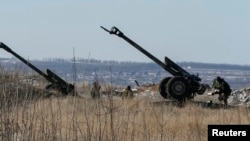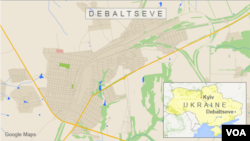Russian President Vladimir Putin is calling on pro-Russian rebels to allow besieged Ukrainian troops safe passage out of the encircled town of Debaltseve in eastern Ukraine.
Speaking Tuesday in the Hungarian capital, Putin also urged the Kyiv government to allow its troops to surrender.
Putin spoke alongside Hungarian Prime Minister Viktor Orban as fighting raged in Debaltseve, despite an internationally brokered cease-fire announced last week by Putin and the leaders of Germany, France and Ukraine.
In the news conference, broadcast on Moscow television, Putin noted that Ukrainian troops were encircled at Debaltseve "about a week before" the truce deal was reached February 12. He also said he'd predicted last week that the encirclement at Debaltseve presaged "one way or another, for some time, that these clashes will continue."
But he said fighting elsewhere in the east had abated since the cease-fire was announced.
The main rebel group fighting at Debaltseve also insists the town was encircled before the cease-fire began Sunday, making it an internal part of the rebel-held region rather than part of the front lines where envoys agreed the fighting would stop.
Under the terms of the cease-fire, both sides were to begin withdrawing heavy weapons from frontal areas Tuesday. But as the deadline passed, each side insisted it would not be the first to pull back from Debaltseve. Ahead of Putin's comments in Budapest, Ukraine conceded that "several army units" were surrounded in the town.
On Monday, separatists offered Ukrainian forces, said to number in the thousands, safe passage out of town if they laid down their arms. But Ukraine promptly rejected the idea, saying Debaltseve lies within its territory under the truce negotiated in Minsk. The devastated town has seen major fighting constantly since earlier truce efforts failed last month.
"As soon as the militants cease fire, the Ukrainian side will begin to withdraw heavy weaponry from the front line," said Ukrainian military spokesman Anatoliy Stelmakh in televised comments.
The U.N. Security Council on Tuesday unanimously adopted a resolution drafted by Russia that supports the Minsk cease-fire deal, while calling on rebels to respect the territorial integrity of Ukraine.
Ukraine and a host of Western governments accuse Russia of stoking the rebellion in Ukraine's Russian-speaking east with arms and fighters, while the Kremlin denies providing direct support.
With those denials flatly rejected by Western governments, the European Union on Monday unveiled a new round of sanctions against Moscow for its widely perceived role in the Ukraine crisis. The new penalties target Russia's deputy defense minister and 18 more individuals with travel bans and asset freezes.
Russia said it would make an "appropriate response" to the sanctions, while condemning them as "inconsistent and illogical" because they were issued within days of the cease-fire that Putin helped negotiate.
State Department reaction
The U.S. State Department said Tuesday it was not in the interests of Ukraine or the world to get into a "proxy war" with Russia over eastern Ukraine, a comment suggesting Washington is now shifting away from arming Ukrainian forces.
“Our belief here in the administration, and I would be surprised if others disagree, is that getting into a proxy war with Russia is not anything that's in the interest of Ukraine or in the interest of the international community,” spokeswoman Jen Psaki told reporters. “And certainly, as we weigh options, we weigh that as one of the factors.”
The Obama adminstratration has not made a final decision on providing Ukraine with lethal aid, and Psaki seemed to have left that option open.
"We certainly believe that a diplomatic approach and a political approach is the right approach here, but the same options that were on the table a week ago or two weeks ago remain on the table," she said. "And so we'll continue to have internal discussions ... about the appropriate" assistance.
The U.S. had voiced concerns earlier Tuesday, saying it is "gravely concerned" over the deteriorating situation in and around Debaltseve.
Senior rebel commander Eduard Basurin said Tuesday that separatists had gained control of more than 80 percent of the east Ukrainian railway hub. "A cleanup of the town is underway," he added.
Kyiv's military denied the town, which had a peacetime population of 25,000 but is now a bombed-out wasteland, had fallen but acknowledged losing control of some of it.
It also acknowledged some Ukrainian soldiers had been captured in an ambush, but it denied rebel reports that up to 300 had surrendered or been taken prisoner.
Rebels: 'Moral' right
Rebel spokesman Denis Pushilin told Reuters the separatists have the "moral" right to defend the city. He also said the rebels were ready for a mutual withdrawal, but would continue to "respond to fire."
Ukrainian President Petro Poroshenko, in a phone conversation with German Chancellor Angela Merkel, condemned the rebels' increased attacks to take control of Debaltseve, calling it a “cynical attack” on the cease-fire deal.
Poroshenko, in a decree, also set out the timetable for the next rounds of military call-up for the rest of the year for men up to 27 years of age.
The peace deal and weapons withdrawal were expected to be the focus of a phone call later Tuesday between representatives of the rebels, Ukraine, Russia, and the Organization for Security and Cooperation in Europe, or OSCE.
The OSCE has been tasked with monitoring the cease-fire, but so far has been blocked by the rebels from entering Debaltseve.
Germany on Tuesday said it had agreed with the leaders of Ukraine and Russia to allow the monitors to reach the besieged town.
At least five Ukrainian soldiers have been killed and nine wounded in fighting, mostly near Debaltseve, over the last 24 hours, a Ukrainian military spokesman said Tuesday.
European Union foreign policy chief Federica Mogherini, asked Tuesday if the peace deal for Ukraine was a failure, said the deal still stands and the EU will insist on its full implementation.
“We knew from the beginning that it was going to be difficult, fragile, probably not black and white,” Mogherini said. “What we need today is to work and insist for the process to get to a positive outcome. ... We would not leave that option, we would not make it fail.”
Some material for this report came from Reuters and AFP.






